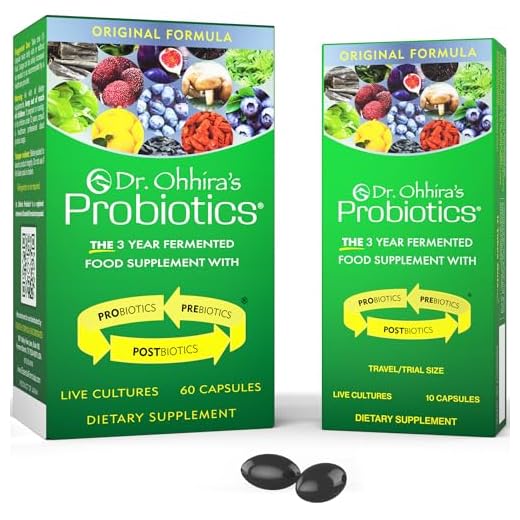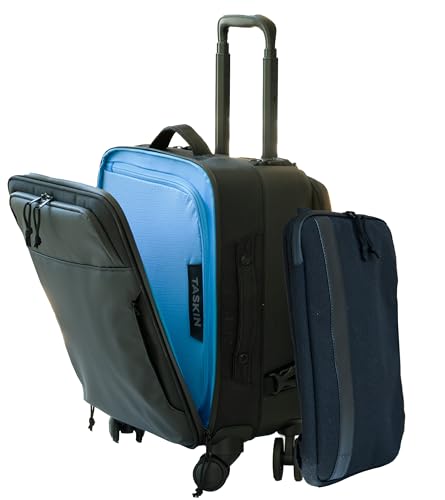







Pack dietary supplements in your travel accessories without hesitation. According to the Transportation Security Administration (TSA) guidelines, these items can be transported in your hand-held bags without restrictions on quantity, provided they fit easily into the screening bins.
Ensure that packaging remains intact and clearly labeled. Choose to keep them in their original containers for identification purposes during security checks. If you opt for loose capsules or powders, storing them in a secure and recognizable manner is advisable. Carry a copy of your prescription or a doctor’s note to support your use of specific supplements.
Stay aware of international regulations if traveling abroad; customs may impose different rules regarding supplements. Research destination-specific guidelines before travel to avoid complications at customs checkpoints.
Can I Bring Probiotic Supplements in My Hand Baggage?
Yes, probiotic supplements can be included in hand baggage, but specific guidelines must be followed to ensure compliance with airport regulations.
- Liquid form products should not exceed 3.4 ounces (100 milliliters) per container and must fit within a quart-sized, clear plastic bag.
- Pills and capsules are typically allowed without restrictions on quantity but should be easily accessible for security checks.
- Ensure that original packaging is intact, as this can facilitate the security process.
- Keep in mind that while some airlines may have additional stipulations, following TSA guidelines is generally a good standard.
For international flights, check the specific regulations of the destination country regarding the import of supplements. Certain regions may have restrictions that vary from standard practices.
- Always consult your health care provider for any recommendations regarding travel with supplements.
- Plan to have a sufficient supply for the duration of your trip to avoid running out or needing to find replacements abroad.
By being aware of these regulations and planning accordingly, smooth travel with your dietary supplements can be achieved.
Regulations for Carry-On Liquids and Gels
Liquids and gels brought onboard must comply with specific restrictions. Items should be in containers no larger than 3.4 ounces (100 milliliters). Additionally, all containers must be placed in a single, clear, quart-sized bag. This bag should be easily accessible for security screening. Products exceeding the size limit or not stored in the appropriate bag will not be allowed past checkpoint security.
Exceptions exist for medications, baby formula, and food items required during the flight, but these must also be presented separately for inspection. It’s advisable to verify airline-specific guidelines as well, as they may have additional stipulations concerning liquid transport.
For those interested in marine life, visiting the best aquarium in europe can be an enriching experience, showcasing diverse aquatic environments akin to the variety of products available for travel.
Choosing the Right Probiotic Form for Travel
Select powdered versions for better portability. Unlike capsules and softgels that require water, powders can be mixed easily into drinks or consumed directly. This flexibility makes them a preferred choice for on-the-go scenarios.
Consider shelf-stable options. Many varieties need no refrigeration, making them ideal for long trips. Check the label for storage instructions to ensure viability throughout your travels.
Look for single-serving packets. These provide precise dosing and eliminate the need for measuring, reducing the risk of spillage. They also fit perfectly into small spaces in your bag.
Check for added ingredients. Some formulations include prebiotics, which can enhance the effectiveness of friendly bacteria. Ensure compatibility with your dietary restrictions for seamless integration during your trip.
When traveling to destinations with different climates, select robust strains that are resilient to environmental changes. Strains like Lactobacillus rhamnosus are known for their durability in varying conditions.
Ensure easy access to your supplies by using an organized travel bag. For outdoor adventures, find the best backpack for thru hiking, as it offers ample space and compartments for organizing your health supplements.
Finally, maintain a routine. Consistency matters more than the type of form you choose. Set reminders to keep on track, especially when traveling. A little planning goes a long way in maintaining gut health throughout the trip.
If you are traveling with little ones, explore options that cater specifically to kids. There are specialized varieties available, and opting for a well-reviewed item can simplify the experience, ensuring comfort for both you and your children. Investing in the best everyday double umbrella stroller can also streamline your outings.
Packaging Probiotics Safely for Air Travel
Use sturdy containers that ensure protection against pressure changes and physical impacts. Opt for packaging that is leak-proof to prevent any spillage during transit.
Choosing the Right Container
- Select small bottles or jars made of durable materials, such as glass or high-quality plastic.
- Consider vacuum-sealed pouches that offer compactness and maintain freshness.
- Avoid using damaged or old containers that might compromise the integrity of the products.
Labeling and Documentation
Clearly label each package with contents and usage instructions. Keep any relevant documentation, such as receipts or product information, accessible for security checks.
For additional protection, include a small ice pack if the items require refrigeration. Ensure the ice pack is compliant with liquid regulations, ideally under 3.4 ounces, and separated from the main contents.
Consider using bubble wrap or cloth to cushion fragile containers and eliminate movement within larger bags. Securely seal the container to prevent accidental opening.
Check the specific airline requirements to guarantee compliance with regulations regarding food and supplement transportation. Being proactive ensures smoother travel experiences.
Understanding International Travel Restrictions
Before traveling internationally, it is essential to comprehend the specific regulations regarding food and supplements, including beneficial microorganisms. Each country sets unique guidelines that can impact what may be brought into their borders.
Country-Specific Regulations
Various nations impose different restrictions on importing supplements. For instance, in the European Union, products must comply with stringent food safety laws, while some Asian countries might require specific permits. Researching the specific regulations of the destination country can prevent potential issues at customs.
Customs and Health Inspections
During customs checks, officials may inspect items for compliance. Having documentation, such as receipts or manufacturer information, could assist in clearing up any concerns. Some countries may allow exceptions for personal use but may restrict quantities. Understanding these limits helps avoid confiscations.
| Region | Regulation Details |
|---|---|
| Europe | Strict food safety laws; registration may be required for some supplements. |
| Asia | Possibly required permits; check specific country guidelines. |
| North America | Generally lax regulations; check state-specific laws. |
Being well-informed about international travel regulations can lead to a smoother travel experience. Always review the official government websites or consult travel experts for the latest information before your trip.
Best Practices for Storing Probiotics While Traveling
Maintain optimal temperature by storing these microorganisms in an insulated container with ice packs, especially in warm climates. This prevents premature degradation and preserves their effectiveness.
Seal individual servings in airtight packaging to protect them from moisture and light exposure. Consider using small, travel-friendly containers that minimize air contact.
Keep these beneficial cultures in a dedicated compartment of your bag to avoid crushing or damage during transit. Opt for soft-sided or padded pouches for added protection.
Utilize original packaging if possible, as it often contains important expiration dates and storage instructions. If transferring to another container, label it with the strain and storage details.
Stay informed about specific storage requirements for different strains, as some may have unique needs for temperature and humidity. Check labels for any specific guidelines.
During air travel, ensure products are easily accessible for screening, avoiding potential delays. Pack them near the top of your bag or in a separate zip-lock for convenience.
When arriving at your destination, promptly refrigerate or place items in a cool environment if necessary. Avoid leaving them in direct sunlight or hot areas.
Alternatives to Probiotics When Traveling
Fermented foods serve as excellent substitutes, offering natural sources of beneficial bacteria. Options include sauerkraut, kimchi, miso, and yogurt. Ensure these items are compliant with travel regulations to avoid security issues.
Dietary Supplements
Enzymes can aid digestion and support gut health. Look for enzyme blends that target various food groups, which can be helpful during travels with diverse cuisines.
Fiber-Rich Snacks
Incorporate fiber-rich snacks like nuts, seeds, and whole grain bars. These promote digestive health and help maintain regularity while on the move. Hydrate adequately, as fiber needs water for effectiveness.







